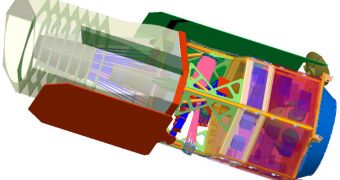Representatives from the American space agency announce that an ambitious project to construct a telescope capable of detecting dark energy will need to be postponed for about a decade, due to cost overruns and mismanagement of another NASA project.
According to the officials, construction on the James Webb Space Telescope (JWST), Hubble's successor, has been going on within parameters lately, but the project is many months behind schedule overall, and a lot over the original budget.
These factors are currently forcing the agency to recognize that it couldn't possibly build and launch an observatory such as the planned $1.6 billion Wide-Field Infrared Survey Telescope (WFIRST).
This instrument would be capable of studying the force that is apparently in charge of constantly accelerating the Universe, and driving its expansion. WFIRST would also be capable of determining the existence of exoplanets around distant stars.
But this flight is unlikely to take place anytime soon. The JWST itself is the first project in line, and it will take a year or two to complete. The goal this observatory will have is to determine how the first stars and galaxies appeared early on in the history of the Universe.
One of the things Hubble's successor cannot do is search for dark energy, the force that experts believe drives universal expansion. It was only recently that such missions got recommendations from the US National Academy of Sciences (NAS).
The group requested that telescopes seeking for dark matter and exoplanets get priority over all other space flights, Daily Galaxy reports.
“How many things can we do in our lifetime that will excite a generation of scientists? [It could be] that we’re starting to give up leadership in these important areas in fundamental physics,” says astronomer Saul Perlmutter.
The expert, who is based at the University of California in Berkeley (UCB), is credited in the international scientific community as being one of the discoverers of dark energy.
NASA is currently proposing postponing WFIRST for a decade, and buying a 20 percent share in Euclid, which is the dark energy-hunting mission of the European Space Agency (ESA).
The flight could take off as soon as 2018. NASA would buy the share under the condition that ESA does the same when the time comes to construct and deploy WFIRST. Most scientists in the US believe that ESA will soon become the dominant power in space sciences.
Detecting galaxy clusters will be one of the main objectives for the new mission. Analyzing dark energy is made simpler by observing how far galaxies are from each other, and at what speed they push away.

 14 DAY TRIAL //
14 DAY TRIAL //